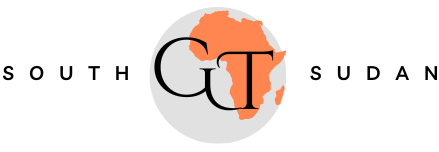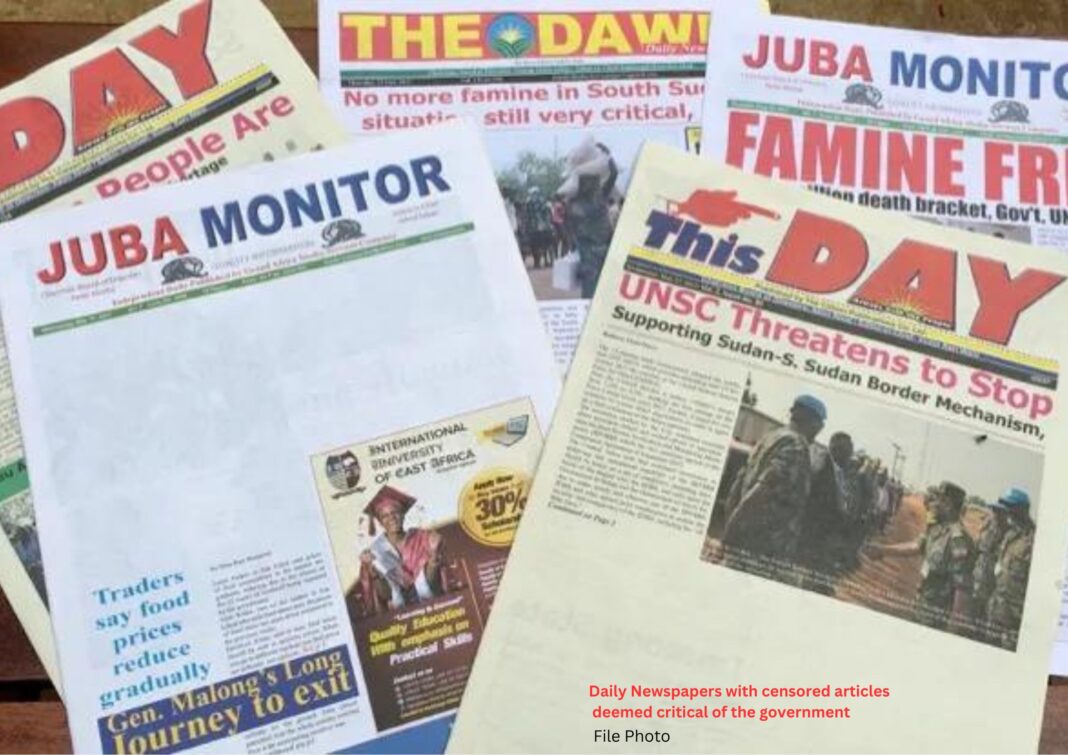Copies of daily newspapers with blank front pages. The stories were removed by security under the pretext that they were unethically written. File Photo
As World Press Freedom Day draws closer, the journalists in South Sudan who are already working in a precarious environment expressed their displeasure over the lack of political will to scrap off the two perilous Sections of the National Security Act 2014.
Early last year, President Salva Kiir Mayardit and his First Deputy President, Dr. Riek Machar agreed to scrap Sections 54 and 55 of the National Security Act 2014 that give excessive powers to the security forces to arrest without a warrant of arrest.
“The national security law where there was disagreement on sections 54 and 55 about the arrest with or without a warrant has now been agreed by the president and first vice president and those will be scrapped,” Cabinet Minister Martin Elia Lomuro told the media.
A journalist working for Al-Hagiga Arabic Daily Newspaper in Juba, Susan Gabriel said arresting journalists without a warrant of arrest from the competent court of law threatens press freedom and frightens journalists from reporting the truth in the country.
“Freedom of expression is a fundamental right that enables individuals to express their opinions and ideas freely, whether through writing, speech, or artistic expression, without being harassed or punished by the government or any other way. We see freedom of expression as one of the most powerful mechanisms that effectively contributes to deepening democracy in the State,” Susan said.
Susan stressed that the manner of arresting people without a court order makes the citizens remain silent for fear of arrest, creates fear among the people, and forces them to keep silent instead of expressing their opinions.
She urged the government to create a friendly environment for the citizens to freely express their opinions as the country craves to transition to democratic governance.
“Article 54 of the Act gives the right to arrest an individual without a judicial order while Article 13 paragraph (11) refers to Frequency monitoring, wireless systems, prints, broadcasting stations, and postal services, both hamper freedom of speech,” she added.
Susan wondered why the country’s political leaders reneged on their promise to remove the two Sections of the National Security Act 2014.
“Arresting an individual without a warrant is a violation of human rights and may constitute a violation of an individual’s rights, which can lead to arbitrary arrest and unlawful use of force, exposing individuals to injustice, torture, and inhuman treatment,” she stated.
She appealed to the Transitional National Legislative Assembly to review the National Security Service Act 2014, which is still in the third reading stage, and ensure that the Sections that violate human rights are deleted urgently to create a suitable environment for the public to express their views freely with fear of reprisal.
Another South Sudanese journalist, who prefers to be treated anonymously over security concerns told The Golden Times that most of the security agents, particularly those deployed in the national capital, Juba act without orders from their superiors.
The journalist recounted the incident that happened in Juba last month where security agents confiscated the accreditation documents of CGTN Africa correspondent, Patrick Oyet without prior orders from their superiors.
“In January this year, some security agents acting on their own confiscated the credentials of CGTN reporter Oyet Patrick. The senior security officer later on apologized saying the security agents were not told to arrest journalists,” the 26-year-old male journalist exclusively told The Golden Times.
The UN report titled ‘Entrenched Repression: Systematic Curtailment of the Democratic and Civic Space in South Sudan’ unwraps a reality marked by severe curtailment of democratic and civic freedoms.
The report names the National Security Service (NSS) as a key institution in the suppression of media freedom, arrest, and detention of journalists.
The Golden Times | South Sudan




